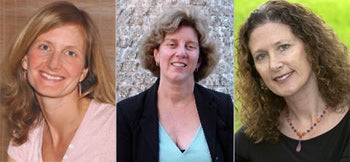A Decade of Law, History and Culture
Since 2001, the Center for Law, History and Culture, based in USC Gould School of Law and USC College, has worked to cultivate the interdisciplinary field of law and the humanities. The center has stood at the cusp of a relatively new academic discipline that studies law as a historical and cultural institution.
Through seminars, conferences and junior scholars programs, the center explores law’s position at the nexus of society from a variety of theoretical perspectives including history, literature, philosophy, political science, gender studies, economics, and legal theory.
“Instead of just having a purely technical discussion or crunching policy analysis, what we’re really getting at is the felt experience of law,” explained Nomi Stolzenberg, professor of law. Stolzenberg co-directs the center with Ariela Gross, professor of law and history, and Hilary Schor, professor of English, comparative literature, gender studies, and law.

From left: Ariela Gross, Hilary Schor and Nomi Stolzenberg are co-directors of the USC Center for Law, History and Culture.
Robert Post, dean of Yale Law School, has presented at the center as part the junior scholars program. He said the Center for Law, History and Culture has played an important role in nurturing this emerging field.
“USC has been a major site for the study of law and the humanities,” Post said. “It has been a model of interdisciplinary work. The center has both inspired the work of many young and established scholars, and has created entirely new academic agendas.”
In honor of 10 years of scholarship, the center will host a special two-day “Tenth Anniversary Conference on Law and Memory” on February 25 and 26 to examine how law and memory intertwine to record the past.
“In a field that is changing as rapidly as law and humanities, how better to mark the present than by measuring our changing relationship to the past — even our own?” Schor said.
According to Stolzenberg, the theme was fitting, especially since the center is commemorating its collective identity as an institution at the decade mark.
“It’s commensurate with our mission and what the center is all about: bringing together these active fields of scholarship such as law and memory, the psychological study of memory and trauma and the study of law. These issues are interrelated, but largely had not been in conversation with one another,” Stolzenberg said.
The event will include a series of panel discussions featuring experts in legal theory, history, psychology, literature, communications and cultural studies who will be looking at law and memory in the context of war, legal trials, slavery, property and trauma.
“A lot of what we try to do through law is organize ways for societies to deal with their pasts and move into the future,” Gross explained. “In the broadest sense, law is always engaged with memory.”
Robert Gordon, a leading legal historian from Yale Law School, will present a lecture calling for judges and scholars to abandon originalism as a theory to interpret the United States Constitution. Other speakers include Pulitzer Prize winner and MacArthur Fellow Annette Gordon-Reed of Harvard University; Marita Sturken of New York University; Paul Saint-Amour of the University of Pennsylvania; Elaine Scarry of Harvard University; and Cheryl Harris of UCLA School of Law.
“Many of the people coming to the conference are part of our community,” Stolzenberg said.
“They’ve helped us run our junior scholars workshops, or they’ve been junior scholars and now they’re our senior scholars. They’ve given workshops, they’ve participated in our conferences. These are our collaborators.”
Bringing together this community of scholars is particularly exhilarating, according to Schor.
The joy of interdisciplinary work, she said, “is that it’s often the most brilliant people who are most eager to take chances — they want to be pushed out of their comfort zone, to explore new worlds of thought, to hear from people who do something that challenges their work in an intelligent way.”
The USC Center for Law, History and Culture “Tenth Anniversary Conference on Law and Memory” will take place Feb. 25 from 8:30 a.m. to 6 p.m. and Feb. 26 from 9:30 a.m. to 4:30 p.m. The event is open to the public. Registration is $10 ($5 for students) and includes continental breakfast and lunch. To register, contact Mira Dalpe at clhcserv@law.usc.edu or (213) 821-1239.
For more information visit the Center for Law, History and Culture’s Web site.
Read more articles from USC Dornsife Magazine’s Spring/Summer 2011 issue